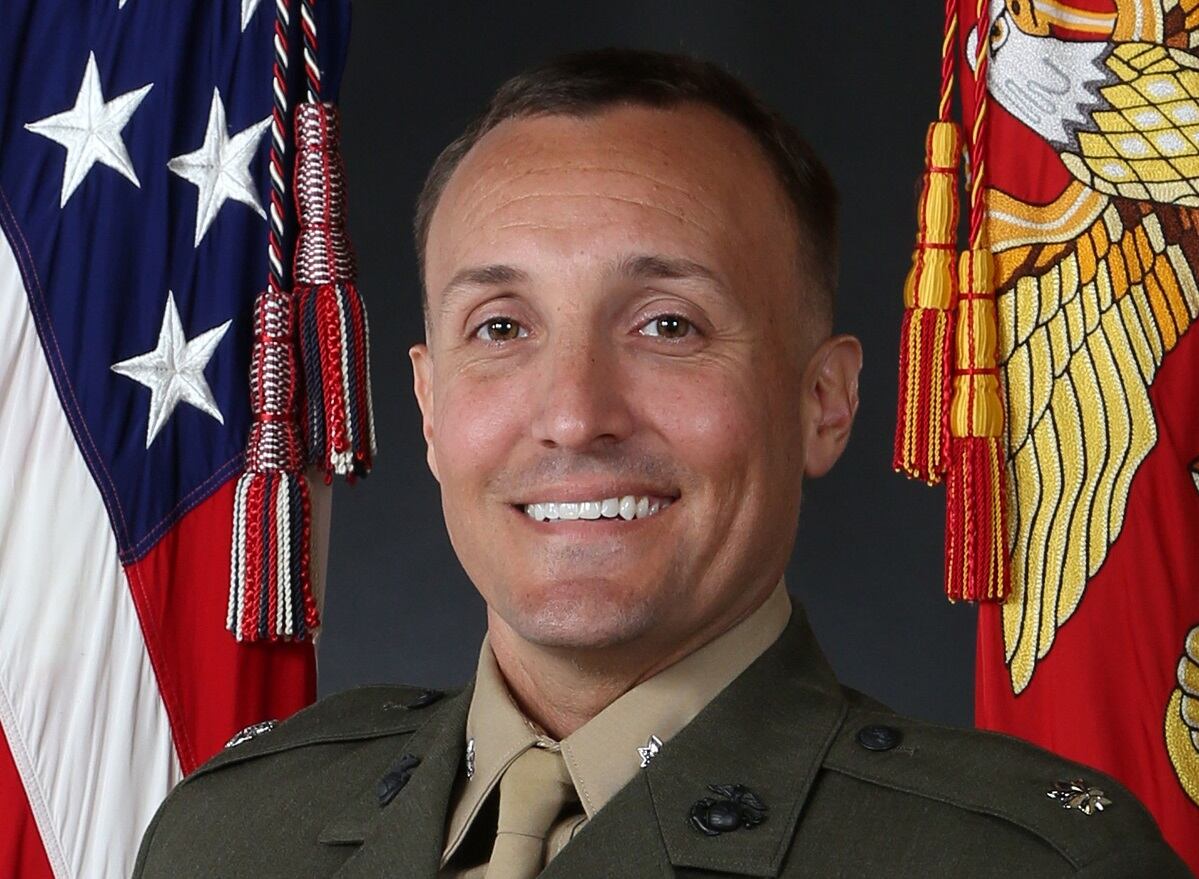CAMP LEJEUNE, North Carolina — When Lt. Col. Stuart Scheller’s defense team called Rep. Marjorie Taylor Greene, R-Georgia, to the virtual witness stand Thursday afternoon, the tablet showing her Zoom testimony to the Camp Lejeune, North Carolina, courtroom fell down.
So did her arguments during the sentencing phase of the Marine officer’s special court-martial, which meandered from her personal 9/11 experience to calls for President Joe Biden’s resignation.
Amid repeated relevancy objections from Lt. Col. Nicholas Gannon, the Marine Corps’ top prosecutor, Greene was cut off multiple times by Col. Glen Hines, the military judge who will rule on Scheller’s sentence Friday.

Earlier in the day, Scheller had pleaded guilty to all charges against him as part of a plea agreement with the Corps, which will conclude a saga that began when he took to social media Aug. 26 to demand accountability from senior leaders for their perceived failures in Afghanistan.
Scheller was convicted of violating Article 88 (contempt toward officials), Article 89 (disrespect toward superior commissioned officers), Article 90 (willfully disobeying a superior commissioned officer), Article 92 (dereliction in the performance of duties), Article 92 (failure to obey an order or regulation) and 27 specifications of Article 133 (conduct unbecoming an officer and a gentleman).
Although the agreement set a maximum punishment of forfeiting two-thirds pay for 12 months, during the afternoon portion of the sentencing hearing prosecutors asked that Scheller forfeit $5,000 monthly for six months. He will also receive a punitive letter of reprimand, resign his commission and receive an honorable discharge or general under honorable conditions as part of the agreement, so long as Navy Secretary Carlos del Toro signs off on the character of the discharge, prosecutors said.
The money is unlikely to be an issue.
Scheller has raised more than $2.5 million through controversial former Navy SEAL Eddie Gallagher’s Pipe Hitter Foundation. That money, according to the foundation’s website, is to be used not only for his legal defense, but also emergency relief funds, relocation expenses and transition out of the military, possible loss of military benefits and retirement, and family support for his wife and three children.
Despite his guilty pleas, Scheller’s stance on the issue of accountability for the chaotic Afghanistan withdrawal remained firm throughout the day, first in his responses to Hines’ questions and later when he delivered a 20-minute statement explaining his actions. He also denied that any of his social media posts called for violence.
“I believe fundamental change needs to occur in the military,” Scheller argued. “I am being held accountable for my actions. The general officers should be held accountable for their failures.”
He also described the challenges he faced after he started making videos and posting his views on social media.
Scheller’s first viral video, which showed him speaking in uniform, was posted to Facebook and LinkedIn Aug. 26 after 11 Marines, a Navy corpsman and a soldier were killed in a suicide bombing at the Kabul airport. That video, which as of Thursday had a total of nearly 1.5 million views on the two sites, garnered him much support and attention, but after that “the system had turned its back against me,” Scheller said during the trial.
After Scheller violated a gag order from his chain of command with subsequent videos and social media posts, he spent more than a week in the brig. He also said that his wife left him.
Scheller said he was moved to continue speaking out by what he called a “two-tiered system of accountability,” whereby senior leaders did not face adverse action, but he — and any other Marine who might speak out about it — is punished for saying “hard truths.”
Three of Scheller’s former colleagues, two of whom were lieutenants with him in Iraq, described him as a “Marine’s Marine” and reflected on the good he had done for the Corps before the crimes to which he pleaded guilty.
Hines, the judge, emphasized that troops “don’t retain the exact same constitutional rights” as civilians. Prosecutors, too, noted that it was not relevant whether Scheller was right or not — he was on trial because of what he said and where he said it.
Scheller shouldn’t have posted online, Tim Parlatore, one of Scheller’s attorneys, acknowledged, but argued that his main point was true.
“What is an appropriate punishment for Lt. Col. Scheller for saying the quiet part out loud?” asked Parlatore. “While the UCMJ requires Marines to publicly respect the office, we hope that Lt. Col. Scheller’s transgression can be used for positive change.”
“We have a lieutenant colonel who decided on his own it was appropriate [for him] to become the voice of change,” said Lt. Col. Troy Campbell, one of the Marine prosecutors on the case. “If you want to exact change, [it can’t be in] a way prejudicial to good order and discipline.”
Political sideshow
Three members of Congress testified during the sentencing phase of the trial: Greene; Rep. Louie Gohmert, R-Texas, who appeared in person; and Rep. Ralph Norman, R-South Carolina, who testified via phone.
While all three politicians argued at least briefly against the perceived “two-tiered” system of accountability — Gohmert at the greatest length of the three — they each had issues tying their testimony back to Scheller’s sentencing. That problem was exacerbated by the fact that none of them personally knew the Marine, which is usually the case for character witnesses called for court-martial sentencings.
Gohmert, who served as an Army lawyer in the 1970s, used his testimony as an opportunity to attack Gen. Mark Milley, the chairman of the Joint Chiefs of Staff and the nation’s top military officer. He argued that Milley had disrespected then-President Donald Trump in June 2020 amid the Lafayette Square controversy in Washington, when he expressed regret for accompanying Trump in uniform during a photo-op walk to St. John’s Church amid George Floyd protests.
Milley has come under fire in recent weeks for the way in which the Afghanistan withdrawal was conducted, drawing calls for his resignation from a significant contingent of lawmakers. Greene has previously called for the general to face court-martial.
Norman drew an unlikely parallel between Scheller and Gallagher, who was acquitted of murder for allegedly stabbing a wounded ISIS prisoner in the neck but convicted of posing for photos with the fighter’s corpse.
But all three lawmakers spoke about the outpouring of support that Scheller received from their constituents, and that’s why they testified, Parlatore told reporters after the day’s proceedings had ended.
“Members of Congress — they represent the people,” he said.
Parlatore also expressed hope that ongoing inquiries into the war will produce the senior leader accountability that Scheller has demanded.
“If [Scheller’s experience] leads to … a broader demand for accountability among these military leaders — and somebody actually looks at this and holds somebody accountable so that we don’t do the exact same thing in the next war — then it’s worth it,” he said.
Davis Winkie covers the Army for Military Times. He studied history at Vanderbilt and UNC-Chapel Hill, and served five years in the Army Guard. His investigations earned the Society of Professional Journalists' 2023 Sunshine Award and consecutive Military Reporters and Editors honors, among others. Davis was also a 2022 Livingston Awards finalist.





